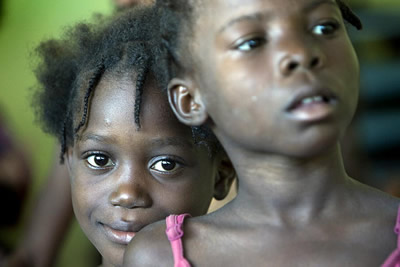Fiscal Covenant, Improved Labour Productivity and Child Protection Policies Are Main Challenges for the Caribbean
Macroeconomic policy for structural transformation and social protection in small States is crucial to achieve sustainable development, said participants.

(Georgetown, 31 May 2012) The Economic Commission for Latin America and the Caribbean (ECLAC) ended its second Caribbean Development Rountable (CDR) meeting on Wednesday with calls for Governments to design a fiscal covenant to address the costs and benefits of fiscal consolidation.
There was strong emphasis on the need of developing social policies in the sub-region designed to embrace all of the poor, while at the same time finding creative ways to raise resources for social protection. This includes creating more robust and dynamic buffers to cushion economic shocks.
During the roundtable, government, private sector, international organizations and civil society representatives discussed on the challenges facing the sub-region, the trade-offs that may be necessary in order to advance medium-term growth and development, and new approaches to meeting these challenges.
The discussion was organized in three panels: one on small States in the global economy after the crisis towards a new development path, the second one on diversifying productive structures and improving access to financing in the Caribbean sub-region, and a third one on maintaining social protection in small States in the context of declining public resources and access to finance.
While addressing the delegates, Trinidad and Tobago's Finance Minister Winston Dookeran made it clear what the focus of the CDR should be when he stated: "We must find a way to integrate the logic of politics with the logic of economics as a way of achieving sustainable development."
Guyana's Finance Minister Ashni Singh reminded the participants that the intellectual effort has to be devoted to make this case, to move beyond an emotional argument. "The world will not be convinced by an emotional argument, there has to be a more credible, robust rigorously articulated case for special treatment of the countries in our region," Singh said.
Before the day ended, the focus quickly turned to the need to advance labour market flexibility in order to enhance productivity and competitiveness. It was emphasized that Governments should build relationships for social dialogue in order to reduce tensions in the labour market. Caribbean countries must focus on social risk management and social protection in order to improve labour productivity and reduce social exclusion.
On the issue of children, it was felt that the sub-region has done well with respect to child protection, but not participation and provision rights. Deep consideration was given to the importance of child-sensitive child protection policies.
Diane Quarless, Director of ECLAC Subregional Headquarters for the Caribbean, stressed the CDR's theme: macroeconomic policy for structural transformation and social protection in small States. "Both of those aspects are crucial to our understanding of how to build resilience in small economies and achieve sustainable development", she said.
And the CDR did follow through on the Director's lead by giving detailed examination on how development in small States could be pursued in the post-crisis global economy through greater economic diversification, improved access to finance and strengthened social protection, despite their fiscal constraints.
Quarless reaffirmed ECLAC's commitment to work closely with the Caribbean Community (CARICOM), the Organization of Eastern Caribbean States (OECS) and other institutions in the Caribbean to address the challenges facing the sub-region.
"We have heavily invested in the future of the CDR and we hope to see it become a dynamic forum that will nurture policy dialogue among the senior decision-makers of the Caribbean sub-region; dialogue from which should emerge valuable insight and understanding in the search for solutions to the range of development challenges that we face", stated ECLAC Director.
The key conclusions and recommendations of the CDR will be presented today to the Caribbean Development and Cooperation Committee (CDCC) meeting, and transformed into practical recommendations, ready for implementation.
For more information, contact ECLAC Subregional Headquarters for the Caribbean. E-mail: registry@eclacpos.org; Tel: (868) 224-8000; Fax: (868) 623-8485; Website: ://www.eclacpos.org/
Contenido relacionado

Economic Growth Should Be Based on Investment, Integration and Innovation, Recommends ECLAC
In a message sent during the second Caribbean Development Round Table, the Executive Secretary of ECLAC Alicia Bárcena highlighted the importance of South-South cooperation.
País(es)
- Caribbean